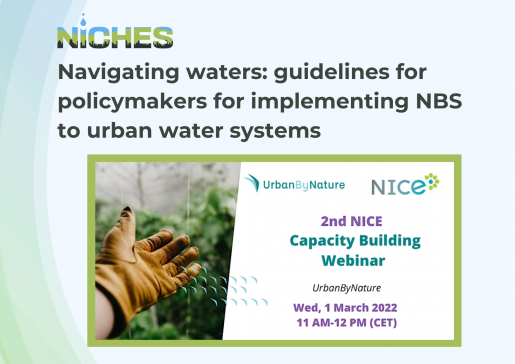Navigating waters: Guidelines for policymakers for implementing NBS to urban water systems
NICE is a Horizon 2020 project exploring the use of nature-based solutions (NBS) to treat water in 11 Urban Real Lab cities worldwide. Thе project’s approach has the potential to reduce pollution and meet the needs of citizens, but it's important to consider the unique needs of each urban area and involve local stakeholders in the implementation process. NICE is providing support in the form of guidelines, business models, and tools to design and select the appropriate NBS.
Much like NICHES and its five case-study cities (Rotterdam, Barcelona & its Metropolitan area (AMB), Boston, Berlin, and Sheffield), NICE understands the importance of researching the implementation of NBS in local environments as the results may vary across geographies.
Similarly to NICE, the MULTISOURCE project works to develop decision-support and planning tools for policy makers and technicians on NBS. The goal is to help prioritise implementation processes for cities to address their unique water-related issues.
On March 1st 2023, NICE and MULTISOURCE hosted a Capacity Building Webinar to develop decision-support and planning tools for implementing NBS in cities facing water-related challenges. During the webinar, partners from the Swedish University of Agricultural Sciences (SLU) and the Catalan Institute for Water Research (ICRA) shared their work on local stakeholder engagement for addressing the prioritisation and subsequent implementation within the UrbanByNature (who were a co-host at the event) and their programme framework.
The presenters - Neil Sang from SLU and Joaquim Comas from ICRA - are experts on water systems modelling and shared their views on how to transfer knowledge to platforms accessible to decision-makers. More specifically, how technical experts initially map their input in statistical software R, and later translate it to a jargon-free language targeting key policymakers. The speakers also mentioned the challenges with this approach, i.e. how the modelling does not factor in complexity of solutions well.
Decision-makers have to be addressed with reports on the life-cycle and cost-benefit analysis of NBS in local contexts in order to allow for an effective implementation of NBS to local urban water systems.
Learn more on NICE’s website.
